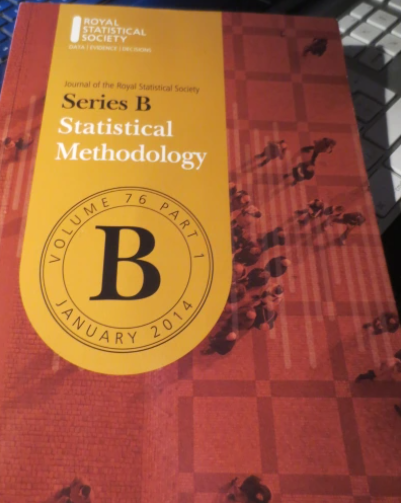经验偏差减少调整估计函数
IF 3.6
1区 数学
Q1 STATISTICS & PROBABILITY
Journal of the Royal Statistical Society Series B-Statistical Methodology
Pub Date : 2023-09-16
DOI:10.1093/jrsssb/qkad083
引用次数: 1
摘要
基于渐近无偏估计函数,提出了一种新的、通用的减偏m估计框架。该框架依赖于通过估计函数贡献的导数函数对偏差的经验逼近。减少偏差m估计可以隐式地解决经验调整的估计方程,也可以显式地从原始m估计中减去估计偏差,并适用于具有可能性或替代目标的部分或完全指定的模型。自动微分可以抽象出实现减偏m估计所需的代数。因此,我们介绍的偏倚减少方法具有更广泛的适用性,直接实现,并且比其他需要重采样或对数似然导数乘积期望的既定偏倚减少方法的代数或计算工作量更少。如果m估计是通过最大化一个目标,那么总是存在一个减少偏差的惩罚目标。这个被惩罚的目标与模型选择的信息标准有关,并且可以通过插件惩罚来增强,以提供具有额外属性的减少偏差的m估计,例如分类数据模型的有限性。m估计器的推理程序和模型选择程序不变地适用于减少偏差的m估计。我们在不同复杂性的良好使用的突出建模设置中演示和评估减偏m估计的性质。本文章由计算机程序翻译,如有差异,请以英文原文为准。
Empirical bias-reducing adjustments to estimating functions
Abstract We develop a novel, general framework for reduced-bias M-estimation from asymptotically unbiased estimating functions. The framework relies on an empirical approximation of the bias by a function of derivatives of estimating function contributions. Reduced-bias M-estimation operates either implicitly, solving empirically adjusted estimating equations, or explicitly, subtracting the estimated bias from the original M-estimates, and applies to partially or fully specified models with likelihoods or surrogate objectives. Automatic differentiation can abstract away the algebra required to implement reduced-bias M-estimation. As a result, the bias-reduction methods, we introduce have broader applicability, straightforward implementation, and less algebraic or computational effort than other established bias-reduction methods that require resampling or expectations of products of log-likelihood derivatives. If M-estimation is by maximising an objective, then there always exists a bias-reducing penalised objective. That penalised objective relates to information criteria for model selection and can be enhanced with plug-in penalties to deliver reduced-bias M-estimates with extra properties, like finiteness for categorical data models. Inferential procedures and model selection procedures for M-estimators apply unaltered with the reduced-bias M-estimates. We demonstrate and assess the properties of reduced-bias M-estimation in well-used, prominent modelling settings of varying complexity.
求助全文
通过发布文献求助,成功后即可免费获取论文全文。
去求助
来源期刊
CiteScore
8.80
自引率
0.00%
发文量
83
审稿时长
>12 weeks
期刊介绍:
Series B (Statistical Methodology) aims to publish high quality papers on the methodological aspects of statistics and data science more broadly. The objective of papers should be to contribute to the understanding of statistical methodology and/or to develop and improve statistical methods; any mathematical theory should be directed towards these aims. The kinds of contribution considered include descriptions of new methods of collecting or analysing data, with the underlying theory, an indication of the scope of application and preferably a real example. Also considered are comparisons, critical evaluations and new applications of existing methods, contributions to probability theory which have a clear practical bearing (including the formulation and analysis of stochastic models), statistical computation or simulation where original methodology is involved and original contributions to the foundations of statistical science. Reviews of methodological techniques are also considered. A paper, even if correct and well presented, is likely to be rejected if it only presents straightforward special cases of previously published work, if it is of mathematical interest only, if it is too long in relation to the importance of the new material that it contains or if it is dominated by computations or simulations of a routine nature.

 求助内容:
求助内容: 应助结果提醒方式:
应助结果提醒方式:


